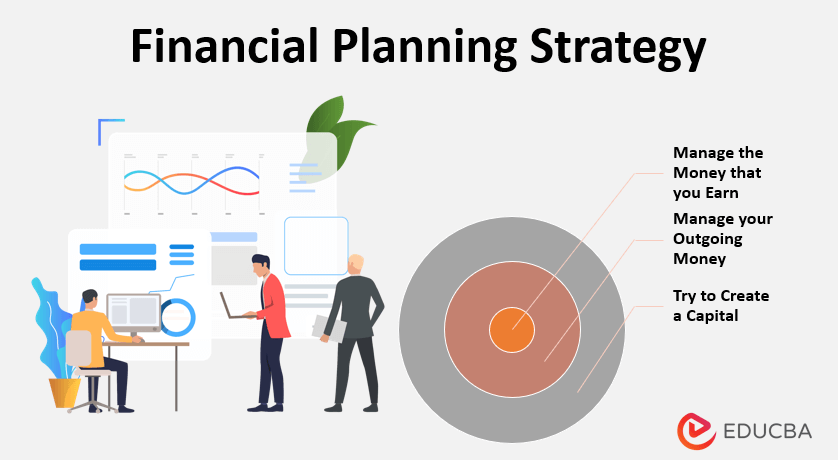
Introduction to Financial Planning Strategy
Financial planning strategy involves smartly managing your finances to prepare for the future. It helps you plan for bigger things like buying a house or retiring comfortably. It acts as a guide that shows you how to save and invest your money wisely to reach these important goals in life.
Living without luxuries is possible; however, living without necessities is not. What if something goes wrong and you don’t have the money to spend? What if you lose your job, and what about your expenditure after you retire? You will not be earning that time; however, in any condition, you will need money for your necessities; what will happen then? In such situations, you can utilize your savings; savings is the amount you save from your monthly salary after spending on your expenditure. First, look at a few reasons that will inspire you to save money.
Financial Planning Strategies
Here are a few techniques to increase your chances of financial success if you need guidance on which strategies perform best.
1. Manage the Money that you Earn
Managing the money you earn is extremely important. You work all month for a reason, and that reason is money. This work involves a lot of stress and hardship, and you take all this stress only to ensure your family and you have a comfortable life without any Financial Planning Strategy issues. Hence, you must manage the money that you earn so that you can avoid wastage and save some money for both your family and yourself.
2. Manage your Outgoing Money
To manage your outgoing money, you need to make sure that you minimize your wastage. Monitor the money you spend and its pattern, see what expenses you can minimize, and try to cut down on those expenses. Budget your expenditures, prioritize your costs, and plan your tax savings. Try to save the maximum of your hard-earned money.
3. Try to Create a Capital
Now that you budget your finances, which is a major step in Financial Planning Strategy, trying to save money by prioritizing your expenses, saving on your taxes, and minimizing the wastage of your money, you can now invest your money somewhere because you have more cash in hand to hold. You can increase your capital by reducing your expenses because you have minimized your expenditure to increase your savings.
4. Create a Financial Security
Saving money for your future can also help you save for your bad time. You never know when the time will change. It might be good for you now, but you never know your future; securing your future is very important, and choosing the right financial Planning Strategy or saving money the right way will give you the security you need.
5. Invest Correctly
Every individual has a different need, for they might require their money today and in the future. As I said today, you are earning and already have money; however, tomorrow, when you stop making, these investments will help you with your daily necessities. So it would be best to plan your assets, whether you want to invest for your retirement, your child’s future, your world tour, etc. According to your necessity, you can plan your investments.
6. No Compromise When You Are Not Working
There are so many restrictions on buying what you like and what you want when you do not have money. Such situations make you feel helpless and shattered, not knowing how to help yourself. Now is the time you may wonder and question yourself on why you did not invest and save for such difficult times.
7. Understand your Financial Goals
Everybody has Financial Planning Strategy goals to meet. If you do not have plans for today, you might have Financial Planning Strategy goals for your future; however, you must have a Financial Planning Strategy goal to ensure you, your career, and your investments are heading in the right direction.
Sit down and understand why and for what reasons you might require money in the future to set your Financial Planning Strategy goals.
8. Asset Building Liabilities
Growing assets is such a nice feeling; it makes you feel so proud of your achievements; however, if these assets are not backed by a liability to pay off. When penalties support your assets, you are more stressed than happy. Assets can also be created without liabilities depending on how you want to make them and with what intentions. Right Financial Planning Strategy goals and mode of creating assets are very important.
9. Save but in the Right Direction
Saving your money as liquid cash in your wallets, lockers, or even your bank account needs to be fixed for you. It is simply keeping your money dead or sleeping. Go out there. You have several options available in the market that will help you turn your money into an asset that can earn money for you. This means your money will be working for you to maximize your asset value.
10. Study the Options Available
Now, you might be thinking that you need to figure out how to invest correctly and where to invest; you might need an advisor who might charge you a commission either directly or through your investment. You do not need an advisor or someone who can invest your money or do a Financial Planning Strategy for you; Self-help is possible. Suppose you want to do it all by yourself without paying anyone anything. In that case, you can directly go online to the websites of the investment companies and check what Financial Planning Strategy benefits they offer you.
How can we do a Financial Planning Strategy?
Now, let’s collect information on how to invest correctly. You want to save money; however, without running out of cash for your monthly expenses, keeping some liquid cash available for unforeseen events, etc., the question is how do you get in the right direction?
Let’s take it a step at a time.
A) Smaller Monthly Options
This is the first time anyone has asked you to invest a huge amount or not. The market is full of options to choose an investment from annual to half-yearly, quarterly, and even monthly.
Companies give you an option of saving as little as Rs 500 monthly. That’s right, and you can invest as little as 500 monthly. You might be thinking about how much difference a $ 500 will make to your future with the growing inflation rate; however, it is better than not saving the right way. Choose an option of investing either in an insurance company for a particular goal or a mutual fund company. The insurance companies call your coming in money your monthly premiums, and mutual funds term these investments as SIPs or systematic investment plans.
B) Grow Steadily with Big Dreams
To invest monthly, you can start an ECS (Electronic Clearing System) facility to debit your bank account electronically every month and credit the respective investment account. You will not have to go down directly to the investment company every month to write them a cheque, nor do you have to give them a series of postdate cheques to debit your bank account.
It is as simple as a click. Besides, if you do not have a monthly fixed income, you can set up online banking or online investment for yourself, and on receipt of the money you receive, you can transfer money online. Set up an ECS facility for the least amount if you want to; this will add your money to your savings every month. And whenever you have excess cash, you can use the internet to transfer money to your investments.
C) Plan Keeping Your Family in Mind
You have never seen your future, so you never know when an unforeseen event will strike. I know it sounds horrible to hear; however, life is full of surprises. Some might be pleasant, and some unpleasant. You want to be equally ready for everything with your family. Well, how is the question? Several insurance companies have facilities for you where you can save money for such unforeseen events.
The motive is to be safe and invest correctly to ensure you are safe and financially protected when such events strike. Some of these insurances include a life cover, medical insurance, accidental policies, cover for theft, natural calamities, fire, etc. If you think you are saving for such an event by keeping your money in the locker or the bank, your intention is correct; however, the saving style must be corrected. Your savings will not earn you the right amount of money, and they will not give you the right returns.
Diversify Your Money
If you think you want to invest all your money in one place, be it in a single mutual fund, insurance, or stock, you will either risk yourself big time or you need to maximize your money appropriately.
- You must have money in recurring deposits of banks where you are sure your money is safe, for you are putting your money in a bank where you even save monthly. Which is how you get used to savings.
- Create fixed deposits; if you have a huge capital you want to invest and feel you might need it soon, you can consider crediting your money into a fixed deposit in a bank where you can also earn interest.
- You can also choose a liquid mutual fund; these funds fetch you interest almost as much as or more than the bank fixed deposits depending on the fluctuations in ROI (Rate of Interest). These funds are highly liquid, and if you wish to withdraw your money, you can have your money credited into your bank account within 24 hours.
- Choose to invest in a debt or an equity mutual fund. A debt fund has low-risk potential and, at the same time, fetches you interest about 1 or 2 percent more than your normal bank fixed deposits. Your equity fund is good at long-term investment for about 4 to 5 years. However, the returns will be phenomenal, depending on the market performance. Equity funds are for people who have a high-risk appetite.
- Invest in insurance if you have a set Financial Planning Strategy goal. You may not have one but several Financial Planning Strategy goals for your future. Choose the right insurance plan your financial advisor has to offer or, as per your study, invest in the program without defaulting on it to ensure you can achieve your Financial Planning Strategy goals and get the money when you need it.
Whatever you invest in, invest it the right way, keeping some liquid money in hand for current expenditures, some in your banks as fixed deposits, some as recurring deposits, some in liquid or debt or equity funds, and some must go into insurance to meet your future Financial Planning Strategy.
Conclusion
Saving money for tomorrow, retirement, and any unforeseen event is as important as earning for today. Remember, I have been repeating myself, telling you repeatedly that you have been spending today because you are earning today; tomorrow, when you do not earn, you will not have the money to spend unless you save for tomorrow, today.
Recommended Articles
This is a guide to Financial Planning Strategy. Here, we discussed a few techniques to increase your chances of financial success. You may also look at the following articles to learn more –


